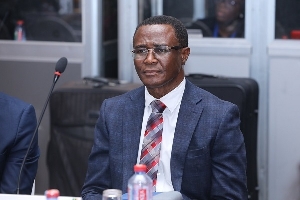The Customs Division of the Ghana Revenue Authority (GRA) has launched an action plan to tackle inefficiencies in the import-export processes at Ghana’s ports and land borders.
Among other things, the action plan includes the introduction of an integrated performance management system and digital tools for customs processes, reduction of human interventions, building capacity of officers, increasing the numerical strength of verification officers and enhancing collaboration with all stakeholders.
The action plan, based on the recommendations in Ghana’s first ever Time Release Study (TRS) conducted with support from USAID FeedtheFuture Ghana Trade and Investment Activity will be implemented by December this year.
The study, which is in line with the World Customs Organisation’s Time-Released Measurement directive, found delays in customs processes, laborious human interventions and some logistic issues as the cause for the long clearance of goods at the four main entry and exit points namely, Tema Port, the Kotoka International Airport, the Afloa and Paga border.
Launching the action plan in Accra on Friday, Rev. Dr Amishaddai Owusu-Amoah, in a speech read on his behalf reiterated the importance of seamless global trade in fostering economic growth.
The action plan, he stated, would lead to a reduction in transaction costs, foster both domestic and international investment and boost the country’s international competitiveness.
He said the study was to identify bottlenecks, support import-export promotion and measure the actual time for clearance of goods at the port and Ghana’s borders.
“For instance at the Tema Port after close monitoring of 713 transactions it was found that on average it takes 10 days 21 hours and 17 minutes for a discharged cargo to exit the port when the target was 17 hours,” he noted.
He stated that the GRA would implement the strategic recommendations to improve efficiency and effectiveness.
The Minister of Finance, Dr Mohammed Amin Adam, said, there was the need to enhance trade processes and reduce barriers to cross-border trade saying that this was necessary for trade facilitation, revenue generation, and economic growth.
He underscored the commitment to encourage free trade among regional countries, reduce cross-border trade barriers, and enhance the efficiency of trade processes.
Reducing clearance time, he said, would ensure revenue generation, increased trade volumes, improved compliance, enhanced economic growth, and heightened attractiveness for investments.
The Economic Growth Director of the United States Agency for International Development (USAID), Andrew Read, commended Ghana’s efforts in trade facilitation and cross-border efficiency.
He stated that efficient trading systems for West Africa’s economic integration would position Ghana as an ideal model for streamlining customs processes.
A World Customs Organisation (WCO) Technical Expert, Phuntsho Dorji, said recent disruptions and vulnerabilities in the international supply chain required that customs administrations use innovative approaches to maintain their role in global trade and security.
Business News of Monday, 4 March 2024
Source: ghanaiantimes.com.gh













